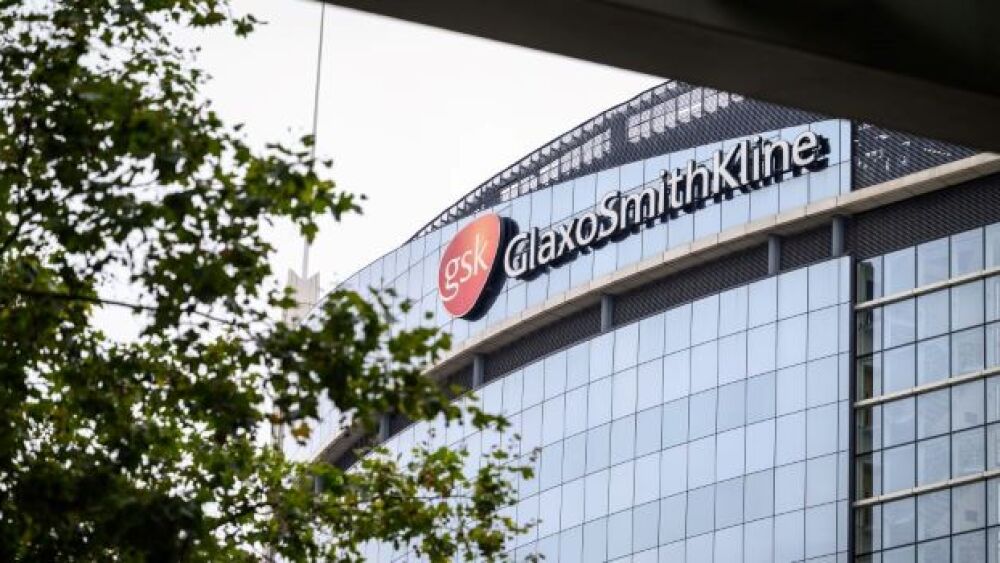The acquisition of Bellus Health will give GSK access to camlipixant, a potentially best-in-class P2X3 antagonist for chronic cough.
Pictured: GSK Headquarters/Image courtesy of Getty Images, Leon Neal
Tuesday, GSK signed an acquisition agreement with Bellus Health for $2 billion to gain access to the Canadian biotech’s chronic cough candidate camlipixant.
GSK will purchase all of Bellus’ outstanding shares for $14.75 a pop, making the per-share sell price 103% better than on Monday. The buyout, still subject to regulatory scrutiny and the approval of at least two-thirds of Bellus’s shareholders, is expected to close in the third quarter of 2023.
Bellus’s shares soared 97.8% in premarket trading Tuesday.
Camlipixant, Bellus’ lead candidate, is a highly selective antagonist of the P2X3 receptor with best-in-class potential. While coughing is a natural bodily response to irritants, refractory chronic cough (RCC) is associated with a higher density of sensory nerves in the airways, according to Bellus’ website.
P2X3 receptors are found on nerves in the airways. When activated, they trigger the excessive coughing characteristic of RCC. Using antagonistic molecules to disrupt the P2X3 pathway could normalize cough reflex and frequency.
In December 2021, camlipixant met its primary efficacy endpoint in the Phase IIb SOOTHE trial. Topline data showed that after 28 days of treatment with 50-mg and 200-mg twice-daily doses, Bellus’ candidate reduced 24-hour cough frequency by 34% compared with placebo.
These effects were statistically significant, according to the company’s press announcement.
At a lower dose level of 12.5 mg, two times a day, camlipixant led to a 21.1% drop in 24-hour cough frequency, though this effect fell short of statistical significance.
In July 2022, Bellus announced it had wrapped up end-of-Phase II meetings with the FDA and was kicking off the Phase III CALM clinical development program, consisting of two studies, CALM-1 and CALM-2. The late-stage program will assess camlipixant’s safety, efficacy and tolerability with an enrollment target of 675 RCC patients.
Bellus kicked off the CALM program in late 2022 and expects top-line data by the second half of 2024. Following regulatory approval, GSK expects to launch camlipixant in 2026.
P2X3 Showdown
The Bellus buyout puts GSK in direct competition with Merck, which is developing its P2X3 antagonist, gefapixant.
Gefapixant is farther along in the drug development process than camlipixant, but it has also had a more troubled run. In March 2021, the FDA accepted Merck’s New Drug Application (NDA) for gefapixant, supported by the two Phase III randomized, double-blinded and placebo-controlled studies COUGH-1 and COUGH-2.
In January 2022, however, the regulator issued a Complete Response Letter rejecting the NDA. Though specific reasons were not given, the regulator said the rejection was unrelated to drug safety. Merck plans to respond to the FDA in the first half of 2023.
Even though Merck is likely to see its P2X3 antagonist through to the market first, GSK remains confident in camlipixant, Luke Miels, chief commercial officer at GSK, said in a media call Tuesday.
Physicians consider camlipixant the better option and prefer the drug over other P2X3 candidates in development, including gefapixant, Miels said. The company expects “significant demand” for camlipixant, with only 6% of providers saying they had current treatment options.
Meanwhile, 92% of doctors said they were open to adopting a second P2X3 antagonist within 12 months of its launch, according to the company.
Tristan Manalac is an independent science writer based in metro Manila, Philippines. He can be reached at tristan@tristanmanalac.com or tristan.manalac@biospace.com.






